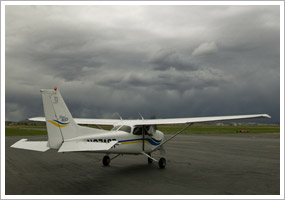
The following stories from the August 8, 2008, edition of AOPA ePilot were provided to AOPA members who expressed an interest in the particular subject areas. Any AOPA member can receive information tailored to their areas of interest by updating their preferences online.
| My ePilot Training Tips |
| FLYING IN THE RAIN Surprised to learn that rain is not a show-stopper? Many students are. Precipitation doesn't always reduce ceiling or visibility to levels prohibitive of visual flight. Think of scattered showers on a sunny summer afternoon. But it's essential to know the VFR weather minimums and what's up with the weather. Is a frontal system approaching? Are there thunderstorms? Is there a risk of freezing rain? Precipitation can reduce visibility, as described in the AOPA Air Safety Foundation's WeatherWise Safety Advisor . Recent or ongoing rain may generate precipitation fog. Precipitation fog forms when rain-saturated air cools to the dew point and could obscure the surface (including the airport). Most instructors won't let students solo when any precip is forecast, as discussed in the Jan. 27, 2006, "Training Tip: Solo Limitations." But dual instructional flights through scattered showers, or in steady rain under a high overcast, are confidence builders. "I started flying in January 2001. The weather was for the most part minimum VFR conditions, so what did we do? We practiced landings and takeoffs in the rain, in the cold, at times in snow flurries. I look at it this way: I was learning to fly in the best or worst conditions. I have the confidence to fly and land in the rain, which many pilots don't get until after they have been flying for some time," a pilot reminisced in "Memorable Moments" in the May 2002 AOPA Flight Training. Unforecast showers or rain on a solo cross-country will seem less worrisome if you know the big picture and take basic precautions. "Flight following is great insurance when flying VFR," Tom Horne advised in the June 2004 AOPA Pilot article "Wx Watch: Non-Frontal Passage." Though controllers handle you on a workload-permitting basis, they can be invaluable in quickly vectoring you to better weather. By already being on an ATC frequency, you avoid the tension and hassles of cold call-ups and busy flight watch frequencies when the weather heads downhill." Read his article and learn how an experienced pilot juggled demands of a lengthy VFR flight in less-than-perfect weather. |
| Training Products |
| GPS FLIGHT GEAR BAG FROM SPORTY'S Note: Products listed have not been evaluated by ePilot editors unless otherwise noted. AOPA assumes no responsibility for products or services listed or for claims or actions by manufacturers or vendors. |
| My ePilot Final Exam |
| Question: I'm a 38-year-old student pilot, and my third class medical expired on June 30 of this year, just a month before the duration of medical certificates were extended. Is the extension retroactive? If so, when does my medical certificate actually expire? Answer: Yes. In fact, the extended duration for first and third class medical certificates for pilots under age 40 is retroactive for any medical certificate issued before July 24, 2008. As you were under age 40 when you received your third class medical certificate, the duration of your medical is extended from 36 calendar months to 60 calendar months! This means that your third class medical, which originally expired June 30, 2008, is now valid through June 30, 2010. Similarly, the duration of first class medicals has been extended from six calendar months to 12 calendar months for pilots under age 40. Learn more about the extended duration medical certificates on AOPA Online. Got a question for our technical services staff? E-mail to [email protected] or call the Pilot Information Center, 800/872-2672. Don't forget the online archive of "Final Exam" questions and answers, searchable by keyword or topic. |
 Can student pilots fly in the rain? Yes. Should they fly in rain? It depends.
Can student pilots fly in the rain? Yes. Should they fly in rain? It depends.

